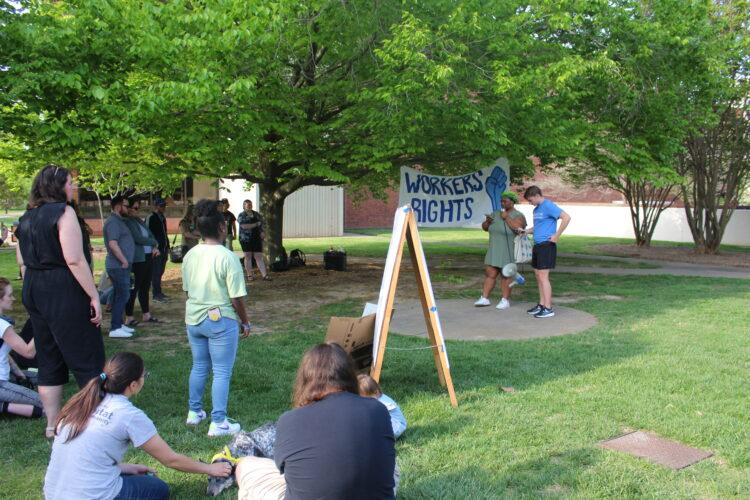Emery Wainscott
News Editor
ewainscott@murraystate.edu
Murray State College Democrats hosted a Workers’ Rights Rally on Monday, May 2, raising awareness about the removal of the 20-hour-a-week cap and a wage increase for student workers, as well as a 10% cost-of-living adjustment (COLA) for faculty and staff.
The rally was hosted with the Murray State Chapter of the United Campus Workers of Kentucky in attendance, who advocate for a $15 hourly minimum wage and safer working conditions for campus workers.
College Democrats President Cady Stribling began the rally with a summary of her own experiences as a student worker, saying $7.25 an hour is not enough for loan and bill payments.
“Workers need livable wages and affordable healthcare,” Stribling said. “The administration retaliates against employees who speak out and that’s no secret … professors and staff are leaving because of it.”
Professor of History David Pizzo took the microphone next, detailing his opinion on the conditions of faculty workers.
“The low point was right before the pandemic,” Pizzo said. “[It was] made very clear, whether you’re working at Amazon or Murray State, there’s all kinds of structures … that are exploitative and got more exploitative during the pandemic.”
Pizzo recognized his faculty privilege as compared to staff and student workers.
He holds several leadership roles, but Pizzo said those with more power than him have made it clear they will ultimately decide the direction of Murray State.
“It’s very clear in the way they spend money … when they want it they find the money for it,” Pizzo said.
With the proposed 2.5-3% COLA, Pizzo said faculty and staff will see more than a 14% pay cut in the next five years, as opposed to if income kept up with inflation.
For comparison, Pizzo said business faculty at University of Tennessee at Martin make about $20,000 more than business faculty at Murray State.
Pizzo recognized that faculty and staff will be affected by inflation to varying degrees. Pizzo said faculty, who are often afforded more speaking privileges than staff or student workers, are risking the least, so he suggests they need to be speaking out the most.
“I love this place maybe too much,” Pizzo said. “I have worked my fingers to the bone for them, and I don’t regret that. That is why Murray State is what it is to you all … but it doesn’t have to be this way. It absolutely does not have to be this way.”
Next, Ryan Ackermann and Dorien Barnett spoke on behalf of Resident Advisers.
On behalf of an anonymous RA, Barnett read out a speech that noted how important housing was to the campus community, while also stating that the workers are heavily underpaid, making $7.50 an hour with a maximum of 20 hours.
Barnett and Ackermann said they were reprimanded for going over 20 hours, despite the job description detailing that RAs are expected to cover shifts for absent employees.
Even with the housing scholarship, many RAs cannot afford to save their paychecks, meaning they live paycheck to paycheck. However, they are not allowed to look for work on the side. Their workplace is where they live, so there is little work-life balance.
“When staff members are quite literally bullied by others, no one will take care of it within professional staff of housing,” Barnett read. “They do nothing to help us when we are literally being bullied by residents.”
Barnett said the conditions are strenuous for RAs as they are expected to deal with situations they are not equipped to deal with. RAs are directed to campus resources, but policies in place keep RAs from further speaking to residents about complaints or issues.
“My voice doesn’t actually matter,” Barnett said. “We have to deal with suicides, drug use … but are not met with any [help]. The University does not seem to care about those who keep the buildings running.”
A 19-year-old sophomore spoke next about her formal Title IX complaint.
As a library worker, she experienced sexual harassment from a student while on the job.
The library worker said the student was known for harassing the workers, to the point where new hires were warned about this individual.
The library worker said a petition was made last year that both library workers and students signed to get the individual banned from the library, but the administration did not respond to the petition.
“This is not just about me,” she said. “It’s about every worker in the library.”
In another instance, the student was watching inappropriate videos while in the library. The library worker said in response, the administration said it wasn’t illegal to watch these materials, despite being in public.
“I am asking them now publicly is that the kind of environment you want for this campus, the one that is supposedly the safest,” she said. “Is that the kind of environment you want your kids to learn in?”
The library worker said she was also discouraged from doing her own investigations and informed of the No Retaliation Policy at Murray State, which means victims are not allowed to retaliate against their assailants.
The library worker said the language in the policy points to the idea that retaliation includes both reporting and speaking about the complaint. The library worker said she confirmed this with several lawyers.
“[The University] wants to keep instances on the down low because they want to be one of the safest campuses in the nation,” the library worker said. “My experience shows otherwise. We need to feel safe where we are working and learning as student workers, because clearly we are an afterthought as these past few months have shown us.”
For those interested in future College Democrats events, visit @msucollegedems on Instagram.


























































































